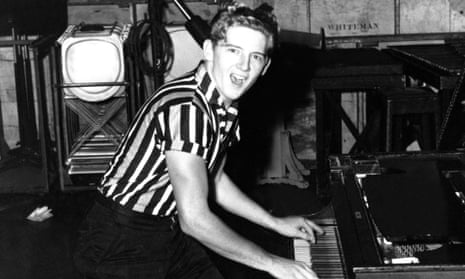The revolutionary force of rock’n’roll’s first wave echoed down the years because it broke racial taboos, mixing black and white music, black and white youth and black and white America. But its most explosive individual moments often emerged from a different kind of tension: that between sin and piety, between God and the devil.
It was a real conflict, as the tapes rolling in Sun Studios on 8 October 1957 proved. Jerry Lee Lewis was up in the city from Ferriday, Louisiana, to record the follow-up to Whole Lotta Shakin’ Goin’ On, the remarkable single that managed to make having chicken in the barn (“Whose barn? What barn? My barn!”) sound like something unspeakably filthy. He’d turned up at Sun to find Sam Phillips had a song for him from Otis Blackwell, who had written for Elvis, and whose Fever was a searingly sexual song without ever being explicit. Blackwell was, if you like, the king of being sexually implicit.
Lewis knew what Great Balls of Fire was really about, and he wasn’t happy. It was the devil’s music, and Lewis feared God. As the tapes rolled and the unholy spirits flowed, he explained to Phillips and the handful of others in the studio: “Brother, I mean you got to be so pure. No sin shall enter there. No sin. ’Cause it says no sin. It don’t say, ‘Just a little bit’. It says ‘No sin shall enter there.’ Brother, not one little bit. You got to walk and talk with God to go to heaven. You got to be so good.”
Finally, around midnight, Lewis was persuaded to take his place at the piano, where two session men – drummer Larry Linn and bassist Sidney Stokes – did their best to keep up. By dawn, as Nick Tosches wrote in his sublime Lewis biography Hellfire: “Sam Phillips knew he had a hit, a record of unrelenting rhythm and mindless venereal splendour.”
In less than two minutes, Lewis is swaggering, ecstatic, vulnerable, orgasmic, postcoital. “Kiss me baby! Mmmmmmmm! Feels GOOD!” Lewis doesn’t sing so much as plead and then exclaim, sliding into his falsetto as if being touched for just a second too long in a place that’s just a little too sensitive. Blackwell didn’t need to write an explicit lyric: between his words and Lewis’s delivery, no one listening had much doubt that the good lord would not have been smiling.
Sixty-three years later, despite pop lyrics having run through wildly more detailed expositions of the sexual act, Jerry Lee still sounds more lascivious than almost anyone since. He doesn’t sound like a lover – he has no interest in how his partner feels, and he’s certainly not going to hang around afterwards (by then, his shame will be too great; he’ll have gone to church to atone) – but like someone who cannot believe such earthly pleasure is possible. The sensations simply spill out of him – not only his voice but also his piano playing, too, his right hand sliding down the keys in exhalations of delight. It was the devil’s music, but Great Balls of Fire still sounds like an act of God.

Comments (…)
Sign in or create your Guardian account to join the discussion